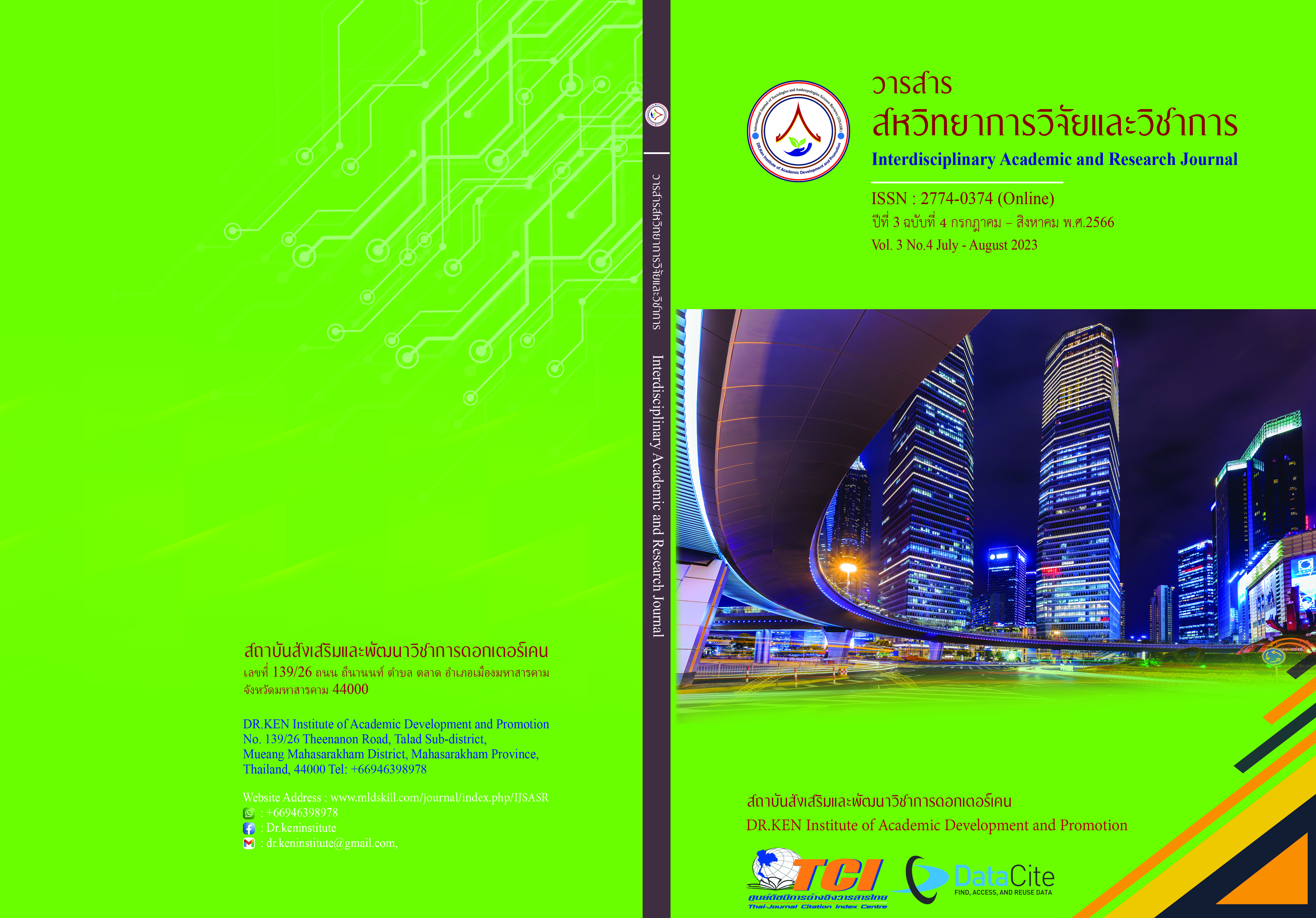The Effects of Folktale Telling with Role-Playing Activities on Social Awareness of Young Children
DOI:
https://doi.org/10.14456/iarj.2023.201Keywords:
Folktales; , Role Play; , Social Awareness; , Young ChildrenAbstract
Organizing folktale-telling and role-playing activities is one of the educational activities that allow children to experience places and people. Folktale stories can help foster social awareness in children because the character traits of storytellers can help children develop empathetic behavior and feelings. The object of this study was to study the effects of folktales telling with role-playing activities on social awareness of early children. The samples were 21 male and female children 3-4 years old studying in K1, semester 2, the academic year of 2022, Tantawan demonstration preschool, Muban Chombueng Rajabhat University under the Ministry of Higher Education, Science, Research and Innovation. The study instruments included 24 plans of folktales telling and roleplaying activities, a form of social awareness behavioral of early childhood children, and journals. Data were analyzed by mean, standard deviation, and content analysis. The results showed that young children who received folktale-telling and role-playing activities had higher average scores of social awareness than before participating in folktale-telling and role-playing activities. In addition, they had higher average scores in the aspects of empathy than the respectful.
References
ณัฐรุจา ท่าโทม. (2565). ผลการใช้กิจกรรมบทบาทสมมติเพื่อเสริมสร้างพฤติกรรมทางสังคมของเด็กอนุบาลในห้องเรียนพหุวัฒนธรรม. วิทยานิพนธ์การศึกษามหาบัณฑิต: สาขาวิชาการศึกษาปฐมวัย มหาวิทยาลัยบูรพา.
นงลักษณ์ อัจนปัญญา. (2565). โรงเรียนในอเมริกาหันพึ่งแนวทาง “บำบัด” เยียวยาจิตใจเด็กนักเรียน. Retrieved on January 23, 2022, from: http://www.eef.or.th/news-overwhelmed-kids.
นิธินันท์ ชารีชุม. (2563). กิจกรรมบทบาทสมมติกับการสอนภาษาอังกฤษสำหรับนักเรียนนายสิบตำรวจ. วารสารลวะศรี มหาวิทยาลัยราชภัฏเทพสตรี, 4(1), 101-108.
เนตรชนก รักกาญจนันท์ และศิริวรรณ วณิชวัฒนวรชัย. (2558). การจัดประสบการณ์การเรียนรู้โดยใช้วรรณกรรมเป็นฐานเพื่อเสริมสร้างทักษะ ทางสังคมของเด็กปฐมวัย. Veridian E-Journal, Silpakorn University. 9 (2), 815-826.
บังอร ศรีกาล. (2553). ผลการพัฒนาทักษะทางภาษาของเด็กปฐมวัยโดยใช้วรรณกรรมเป็นฐาน. วิทยานิพนธ์ปริญญาการศึกษามหาบัณฑิต สาขาวิชาหลักสูตรและการสอน บัณฑิตวิทยาลัย มหาวิทยาลัยมหาสารคาม
ปณิดา ทองมูล. (2555). ผลการจัดกิจกรรมการเล่านิทานประกอบการแสดงบทบาทสมมติที่มีต่อความรู้เรื่องภาวะโลกร้อนของเด็กปฐมวัย. วิทยานิพนธ์ศึกษาศาสตร์มหาบัณฑิต: สาขาปฐมวัยศึกษา มหาวิทยาลัยเกษตรศาสตร์.
พนิดา ชาตยาภา. (2559). เทคโนโลยีกับเด็กปฐมวัยในศตวรรษที่ 21. วารสารวไลยอลงกรณ์ปริทัศน์ (มนุษยศาสตร์และสังคมศาสตร์), 6(2),151-162.
เมธวิน ปิติพรวิวัฒน์. (2564). 21st-Century Skill: ทักษะแห่งศตวรรษที่ 21. Retrieved on January 23, 2022, from: http://corporate.baseplayhouse.co/21st-century-skill.
ศุภมาศ ลิ้มวัฒนพงษ์. (2563). ผลการจัดกิจกรรมละครสร้างสรรค์ที่มีต่อการตระหนักรู้ทางสังคมของเด็กปฐมวัย. Valaya Alongkorn Review (Humanities and Social Science). 12 (1), 30-46.
CASEL. (2022). Social Awareness. Retrieved March 30, 2023, from: http://casel.org/fundamentals-of-sel/what-is-the–casel-framework/#social-awareness
Krish, P. (2001). A Role Play Activity with Distance Learners in an English Language Classroom. The Internet TESL Journal. 7 (7), 1-6.
Ministry of Education the Republic of Singapore. (2013). Volume 7 Nurturing Early Learners A Curriculum for Kindergartens in Singapore Social and Emotional Development. Retrieved March 30, 2023, from: http://docplayer.net/9863952-Volume-7-nurturing-early-learners-a-curriculum-for-kindergartens-in-singapore.html.
Downloads
Published
How to Cite
Issue
Section
License
Copyright (c) 2023 Umaporn Khaopongsai , Chalatip Samahito

This work is licensed under a Creative Commons Attribution-NonCommercial-NoDerivatives 4.0 International License.
Copyright on any article in the Interdisciplinary Academic and Research Journal is retained by the author(s) under the under the Creative Commons Attribution-NonCommercial-NoDerivatives 4.0 International License. Permission to use text, content, images, etc. of publication. Any user to read, download, copy, distribute, print, search, or link to the full texts of articles, crawl them for indexing, pass them as data to software, or use them for any other lawful purpose. But do not use it for commercial use or with the intent to benefit any business.
















.png)


